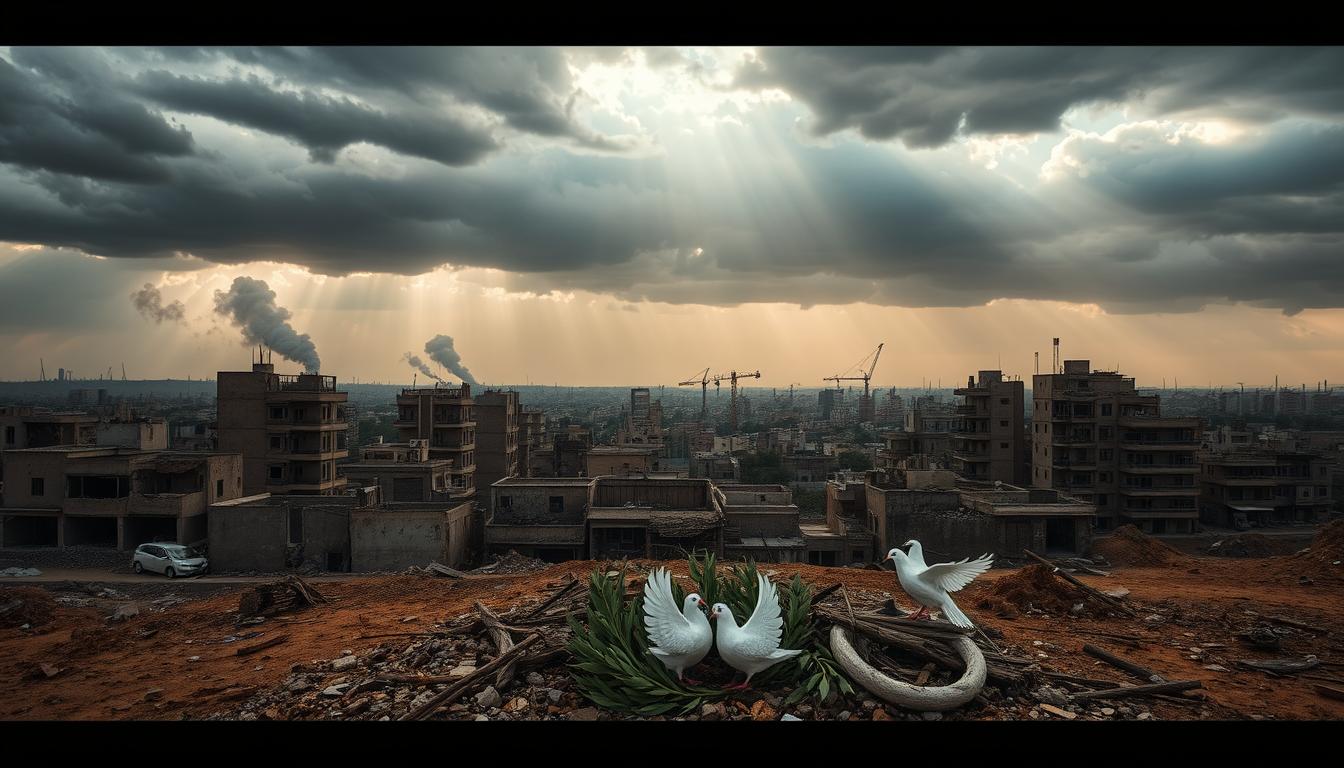The Middle East conflict, particularly the ongoing tensions in Gaza, holds far-reaching consequences that ripple across the fabric of international relations. This intricate geopolitical puzzle not only impacts regional stability but also extends its influence toward the global impact of international dynamics. The complexity of the situation is heightened when one considers the assertive measures taken by Israel. Strategist Dennis Ross has underlined the nation’s firm position on the possibility of preemptive strikes against Iran, revealing the depth of the stakes involved. This posture has been demonstrated in the escalation of kinetic actions against Iranian proxies, including an aggressive stance taken by Israel in the northern front1.
Such actions have yielded a temporary strategic advantage, catalyzing the evacuation of Israeli communities1, while Iran and Hezbollah have utilized measures such as human shields, magnifying Gaza tensions and challenging the international community’s response1. Meanwhile, President Biden’s administration, through envoy Robert Malley, faces scrutiny over its approach to dealing with Iran, particularly concerning sanctions tied to their nuclear program1. The pertinence of these developments is further underscored by the growing concerns expressed by global leaders, with Russian President Vladimir Putin addressing environmental challenges2, Ethiopian Prime Minister Abiy Ahmed advocating for South-South cooperation2, and Iranian President Masoud Pezeshkian calling for stronger BRICS solidarity against Western sanctions2.
Amid these unfolding events, the US intelligence community has identified the direct threat of Iran through potential proxy attacks1. Israel’s commitment to safeguarding its people is evident in bolstering its missile defense systems, demonstrated by the recent $5.2 billion increase in American funding1. In the face of such challenges, debates within the country, such as those between Maj-Gen. (res.) Itzhak Brik and security expert Yair Ansbacher, reflect the existential question of whether engaging in war with Iran is both inevitable and necessary for Israel’s survival1.
The reverberating effects of this perpetuated state of conflict have not spared even heritage sites and educational institutions, marking a tragic loss of history and future potential for Gaza and the broader region. The devastation extends beyond borders, with the World Bank estimating critical infrastructure damages in Gaza to be around $18.5 billion from October 2023 and January 20243.
Key Takeaways
- Israel’s defensive strategies have led to significant collateral damage and global diplomatic consequences1.
- The debate on Israel’s potential preemptive strike against Iran exemplifies the high-stress international environment1.
- The Biden administration’s policy toward Iran remains a point of contention, impacting global geopolitics1.
- The destruction of educational heritage in Gaza underscores the severe cultural and human loss inflicted by the conflict3.
- Global responses, including BRICS nations, reflect a shifting dynamic in international relations and resistance to Western influences2.
- Global leadership positions on environment, development, and conflict reflect diverse priorities that affect geopolitical alliances2.
The Escalation of Tensions and Its Direct Consequences
The Middle East region has seen a sharp escalation in tensions, primarily driven by strategic military actions and provocative rhetoric between powerful regional players. This has cascading effects on global economic stability, regional security, and the humanitarian plight of civilians caught in the crossfire.
Israel’s Strategic Offensive Against Hezbollah
In an increasingly volatile Iran-Israel conflict, Israel’s proactive defense is manifested through targeted Hezbollah offensives. High-profile operations, such as the Masyaf operation, highlighted Israel’s commitment to preemptive military options. This robust approach is part of a broader strategy to neutralize threats and maintain regional security amidst growing nuclear threats4.
Iran’s Provocations and Israel’s Countermeasures
Amidst escalating Iran-Israel conflict, Iran has intensified its IRGC activities, fostering instability across the border. In response, Israel has been forced to scale up its military readiness, aligning with its historical stance of ensuring existential security through strong defensive and offensive postures. The sophistication and frequency of these engagements signal a potent war of attrition aimed at deterring long-term security threats5.
Impacts of the Conflict on Israeli and Lebanese Civilians
On the human front, the human shields and civilian displacement tactics used by Hezbollah, supported by Iran, have led to severe humanitarian crises. These strategies, meant to buffer militant groups from direct attacks, violate international humanitarian law and exacerbate civilian suffering in the region, manipulating international opinions and isolating Israel diplomatically5.
| Impact | Details | Data Source |
|---|---|---|
| Economic Shifts | Crude prices have decreased by almost 20% since the onset of hostilities4 | Financial Markets Report |
| Humanitarian Crisis | Over 40,000 civilians killed; over 1.5 million displaced5 | UN Reports, Relief Agencies |
| Banking Sector Outlook | Potential outflows of up to $275 billion in GCC banks under worst-case scenarios4 | S&P Global Analysis |
| Regional Security | Increased frequency of military engagements and nuclear threats escalate regional tensions5 | Security Assessments |
The complexities of the Iran-Israel conflict, intertwined with geopolitical maneuvers and the dire human costs, underline a deeply entrenched conflict that requires nuanced global interventions and a robust understanding of Middle Eastern geopolitical dynamics. Community resilience and international solidarity remain pivotal in navigating the harsh realities of these regional skirmishes.
The International Diplomatic Arena and Its Responses
In the intricate geopolitical tapestry of the Middle East, key players actively contribute to the region’s diplomatic dynamics. Amid escalating regional tensions, the United States asserts its influence through calibrated US foreign policy strategies. This power play must balance the need for stable Middle East alliances while addressing Iran’s nuclear threat. Secretary of State Antony Blinken has highlighted the proximity of Iran to achieving nuclear capacity, a concern that perturbs both America’s foreign policy architects and Israel’s defense strategists6.
The Role of the United States in Middle Eastern Politics
While managing global threats posed by China, North Korea, and Russia, the US remains intricately involved in reducing Iran’s potential nuclear capabilities, which would indeed change the power dynamics in the region. The vacillation of the US in the Middle East could inadvertently place an overwhelming security burden on Israel, compelling them to independently address the existential Iranian regime threat. The American endeavor extends to creating a coalition potent enough to impose economic sanctions, aiming to curb Iran’s nuclear aspirations and fostering the idea of nuclear non-proliferation7.
Iranian-French Relations and Their Effect on the Conflict
French diplomacy plays a crucial role, as evidenced by meetings between Iran’s President Masoud Pezeshkian and France’s President Emmanuel Macron. While striving for a diplomatic resolution, the nuanced stance of European powers is characterized by their reluctance to fully commit against Iran, even as the future of Israel hangs in the balance. French support has, notably, translated into advocating for enhancing Lebanese armed forces – a move that underscores France’s acknowledgment of the situation’s complexity7.
Global Pressure and Economic Sanctions against Iran
The strategic calculus continues to evolve as global pressure escalates, primarily through economic sanctions and attempts by nations to destabilize the Iranian regime. Yet, Tehran’s resistance to International Atomic Energy Agency (IAEA) compliance and blatant uranium enrichment advancements only adds to the urgency of a collective response. As the international community grapples with these challenges, seeking a cohesive stance becomes increasingly critical to ensuring the stability and security of the region, all while upholding the tenets of nuclear non-proliferation8.
FAQ
How does the ongoing conflict in Gaza affect global geopolitics?
What are Israel’s strategic reasons for its offensive against Hezbollah?
How has Iran escalated tensions with Israel, and what are Israel’s countermeasures?
What are the direct consequences of the Middle East conflict on Israeli and Lebanese civilians?
How does the current U.S. administration’s approach to sanctions on Iran affect the situation?
How could international responses like economic sanctions impact Iran’s aggressive stance in the region?
What is the significance of high-level meetings between Iran and France in dealing with the conflict?
In what way do the strategies of Iranian and Hezbollah in the conflict violate international humanitarian law?
Why is there a growing concern over Iran’s resistance to IAEA compliance checks?
What are the implications of Secretary of State Antony Blinken’s statements on Iran’s nuclear capacity?
Source Links
- Is Iran next? Israel’s next move after Hezbollah – opinion – https://www.jpost.com/opinion/article-825508
- Highlights of World Leaders’ Addresses at BRICS Plus Outreach Meeting in Russia’s Kazan – https://en.sputniknews.africa/20241024/highlights-of-world-leaders-addresses-at-brics-plus-outreach-meeting-in-russias-kazan-1068853509.html
- The year that saw the cultural devastation of Gaza – https://www.newarab.com/features/year-saw-cultural-devastation-gaza
- Watch Gulf funds, not oil, for Middle East stress fallout – https://www.theglobeandmail.com/investing/article-watch-gulf-funds-not-oil-for-middle-east-stress-fallout/
- BRICS Plus/Outreach plenary session at the 16th BRICS Summit – http://en.kremlin.ru/events/president/news/75384
- Pashinyan’s Peace Agreement Statements and the Understanding Between the Two Countries – https://raillynews.com/2024/10/pasinyandan-baris-anlasmasi-aciklamalari-ve-iki-ulke-arasindaki-mutabakat/
- Israeli strike kills Lebanese troops during evacuation – https://www.rte.ie/news/2024/1024/1477142-middle-east/
- Editorial Roundup: United States – https://www.wral.com/story/editorial-roundup-united-states/21685768/



